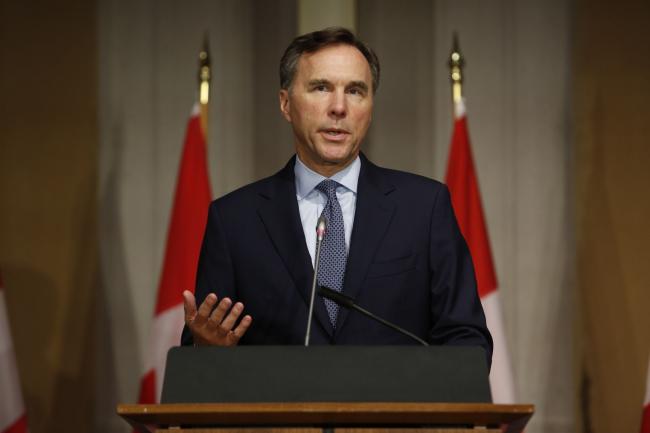(Bloomberg) -- Canadian Finance Minister Bill Morneau resigned after a rift with Justin Trudeau proved impossible to repair, leaving the cabinet with a major hole in the midst of a deep recession.
Morneau made the announcement at a press conference in Ottawa on Monday evening, saying he told the prime minister earlier that day he doesn’t intend to run in the next election. The government did not immediately name a replacement. Mark Carney, the former Bank of England and the Bank of Canada chief, and Deputy Prime Minister Chrystia Freeland are names that have being circulated as potential replacements in recent days.
The resignation comes at a critical moment for Trudeau as his government develops an agenda for the economic recovery amid historically high unemployment. The government is expected to introduce significant changes to the country’s social programs, including employment insurance and childcare.
“It’s the right time for a new finance minister to deliver on that plan for the long and challenging road ahead,” Morneau said. “We know that now, the next step is going to be a long and uncertain recovery, and we need a finance minister that’s going to be there for the long term.”
He said he would put his name forward to be secretary general of the Organisation for Economic Co-operation and Development.
The Trudeau-Morneau rift burst into full view after Bloomberg News reported on Aug. 10 that Carney is advising the prime minister on an economic recovery plan. Trudeau released an extraordinary statement the following afternoon stating his “full confidence” in Morneau, as speculation grew over whether he’d be replaced in an expected cabinet shuffle. The two men met on Monday.
Multiple officials told Bloomberg a rift between the prime minister’s office and Morneau’s finance department has grown over disagreements on how to direct C$240 billion ($181 billion) in Covid-19 emergency spending. Points of debate have included how much unemployed workers should receive under the Canada Emergency Response Benefit, the government’s flagship Covid-19 income support program, and whether to increase a wage subsidy for businesses impacted by the pandemic.
The controversy surrounding a C$43.5 million government student grant contract has also strained the relationship. Trudeau and Morneau are both under investigation by the ethics watchdog over potential conflict of interest in the awarding of the contract to the WE Charity, which has used Trudeau’s mother, brother and wife as paid speakers at events and employed Morneau’s daughter. Both men appeared before parliamentary committees over the matter.
Trudeau and Morneau’s chief spokespeople had denied the tensions were anything beyond what is typical between the prime minister’s office and the finance department.
“Every step of the way, Bill and I have worked closely together, along with our team of cabinet ministers and caucus members to help Canadians navigate this challenging time,” Trudeau said in a statement. “Our number one priority has been supporting Canadian families and businesses the best and fastest way possible.”
©2020 Bloomberg L.P.

